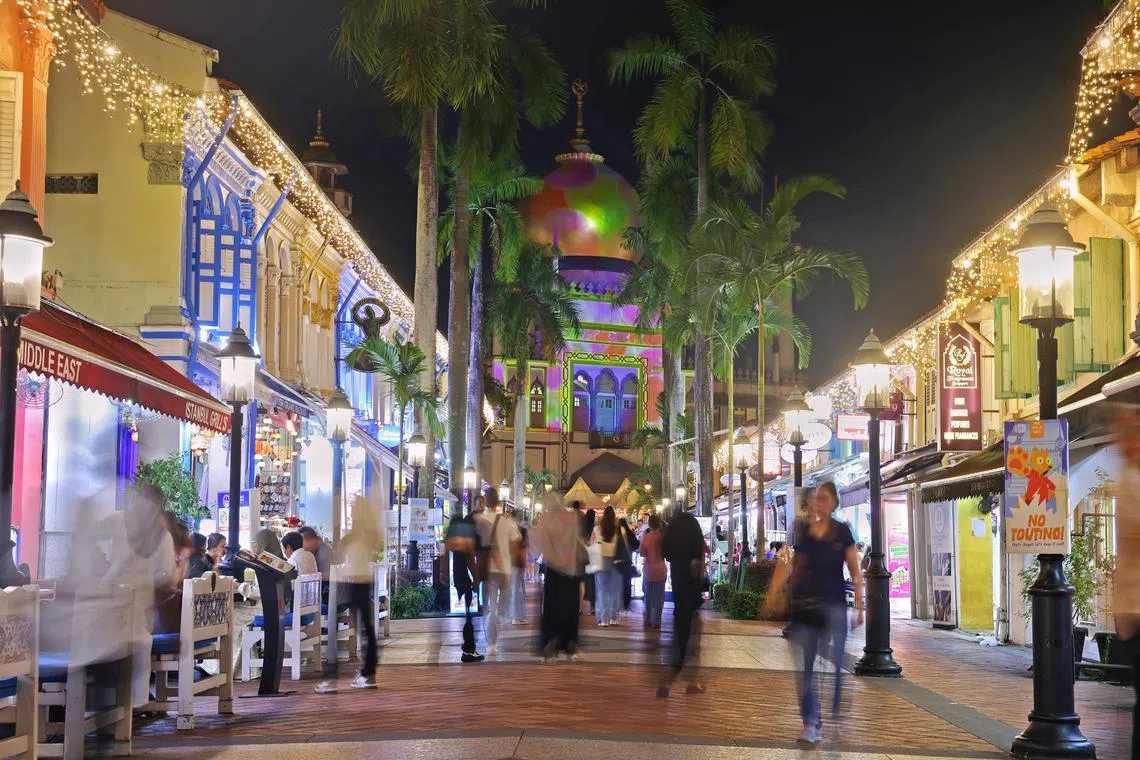New task force to help grow and sustain heritage businesses in Singapore’s historic precincts
Sign up now: Get ST's newsletters delivered to your inbox

The Sultan Mosques' facade illuminated by a light show at the official opening of Kampong Glam Ramadan Bazaar on Feb 21.
ST PHOTO: JASON QUAH
SINGAPORE - Heritage businesses will get more support to grow and sustain their trades from a new task force set up to keep traditional trades and crafts alive.
The group will help them in areas such as labour, skills transfer and business transformation, said National Development Minister Desmond Lee at the official opening of the Kampong Glam Ramadan bazaar on Feb 21.
Mr Lee said the Government has established the task force because heritage businesses face challenges such as rising costs, increasing competition and changing consumer preferences.
Some businesses that provide time-honoured goods and services, such as eateries selling traditional foods as well as kebaya and perfume makers, risk losing their craft, as artisans find it difficult to attract and retain younger talent, he said.
“These heritage businesses nurture strong community ties and sustain the spirit of enterprise in our historic districts. Some have even become our Singapore brand ambassadors,” said Mr Lee.
The Urban Redevelopment Authority (URA) and National Heritage Board (NHB) said the task force will look at policies, schemes and programmes to help businesses grow sustainably, including identifying heritage businesses and exploring how they can benefit from various government initiatives.
It will also work with business associations and various parties to promote the cultural offerings and heritage businesses in Singapore’s historic districts.
Mr Lee said the group will also study the spaces, infrastructure and place-making initiatives that may be needed to sustain Singapore’s cultural heartland in Chinatown, Kampong Glam and Little India. Place-making refers to proactively managing an area to make it better.
This may include reviewing policies to improve the mix of uses and activities in Singapore’s historic districts so as to support cultural, community and enterprise activities, and build up place-making capabilities among local groups, Mr Lee added.
“Protecting and sustaining our heritage, including our heritage businesses in our heritage districts, is not just about safeguarding the past, but it is also about shaping the future and ensuring that heritage, cultural and historic footprint continue way into the future,” he said.
Over the next few months, the task force will speak to partners and other parties, such as local associations, community leaders and business owners, to develop its plans for heritage businesses and traditional activities.
It will provide more details about these plans when they are ready, said Mr Lee.
The total number of heritage businesses in the three districts is not known.
The task force, chaired by Senior Minister of State for Culture, Community and Youth and Trade and Industry Low Yen Ling and Minister of State for National Development and Home Affairs Muhammad Faishal Ibrahim, includes representatives from the Culture, Community and Youth, National Development, Finance and Manpower ministries.
Representatives from statutory boards such as trade agency Enterprise Singapore, the National Arts Council, NHB, the Singapore Land Authority, Singapore Tourism Board and URA will also be part of the group.
Ms Fauzia Rani, the third-generation owner of VSS Varusai Mohamed & Sons, said she hopes the task force will help heritage businesses like hers gain exposure and work with landlords to control rent increases. Her store in North Bridge Road, within Kampong Glam, has sold religious accessories to Muslims making the haj pilgrimage since 1935.
She told The Straits Times that competition from e-commerce and rents, which have climbed by 20 per cent to 25 per cent since 2020, had forced her to downsize from two retail units to one in 2021.
Many shops selling traditional crafts such as rings and rattan baskets that were in the area for decades have shuttered in recent years, she added.
“The area has lost much of its historic value, and seeing the other shops vanish also makes me think of giving up sometimes,” added Ms Fauzia, who is in her late 30s.
“But the shop holds a lot of precious memories for my family, and our entire lives have revolved around Kampong Glam, so I want us to keep it going for as long as we can. Hopefully, the task force can help us do that.”
Singapore Heritage Society president Fauzy Ismail said he is glad the new group brings together various government agencies because conservation efforts can be quite segmented, with different agencies having separate portfolios.
“A combined effort will help with looking at conservation more holistically, to consider not only the built heritage of a building or a place, but also the businesses there and the role they played in Singapore’s development,” said Mr Fauzy.
He also suggested expanding the scope of the task force’s work to include heritage businesses across Singapore, such as those in areas like Geylang Serai.
At the opening of the Ramadan bazaar, Mr Lee also said that the Kampong Gelam Alliance (KGA) – a voluntary group of residents, cultural institutions, business organisations, property owners and hotels in the area – has been incorporated as a company limited by guarantee (CLG).
A CLG is typically formed to carry out non-profit-making activities that have some public or national interest.

National Development Minister Desmond Lee speaking at the official opening of the Kampong Glam Ramadan bazaar on Feb 21.
PHOTO: LIANHE ZAOBAO
The new entity will be led by three community leaders – KGA chairman Saeid Labbafi; Mr Zaki Ma’arof, chairman of One Kampong Gelam, an association that aims to enliven and establish Kampong Glam as a vibrant cultural district; and Mr Ibrahim Tahir, owner of the Wardah Books bookshop. Associate Professor Faishal will guide the new entity.
Mr Lee said that as a CLG, KGA will be more widely recognised as a representative of the Kampong Glam community, and it can enhance its capacity to manage the community’s resources more effectively.
The move comes on the back of a five-year blueprint unveiled in 2023 by KGA to liven up and attract more visitors to Kampong Glam, one of Singapore’s earliest conservation areas with more than 600 shophouses.
When asked how becoming a CLG will help advance KGA’s work, Prof Faishal said the alliance can now obtain direct funding from government agencies.
The Ramadan bazaar at Kampong Glam runs till March 25. It features 120 stalls – 80 for food and drinks, and 40 for retail – as well as a light show at Sultan Mosque, traditional performances, and activities to mark Singapore’s 60th year of independence, SG60, including a treasure hunt and a tour of Kampong Glam.
The holy month of Ramadan falls between March 1 and 30.



